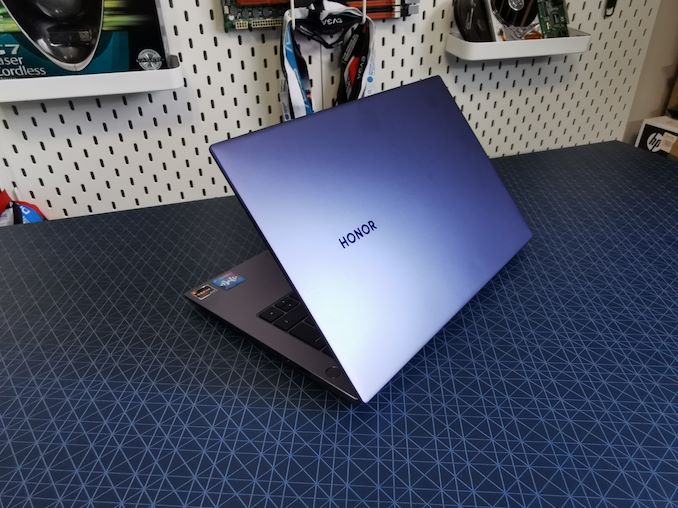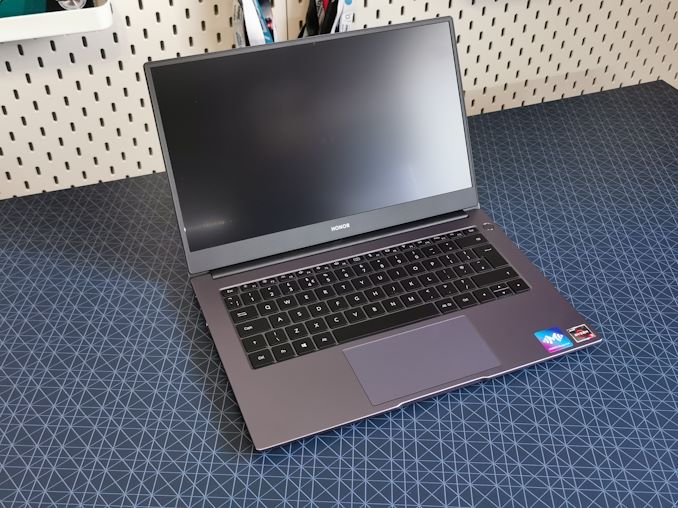Honor Magicbook 14 Notebook Review: Where Style Paints a Picasso
by Dr. Ian Cutress on May 15, 2020 9:00 AM EST- Posted in
- Laptops
- AMD
- Notebooks
- Zen
- honor
- Picasso
- MagicBook
- Magicbook 14
- Ryzen 5 3500U
Conclusions
Over my years as a technology journalist, travelling to events, I’ve used a variety of notebooks for my work. These vary from an old Dell M4400 that weighed over 8 lbs with its two batteries that lasted a total of five hours, down to dual core AMD netbooks, a Cannon Lake laptop with 3 hours battery life, and some extra special thin and light notebooks that last almost all day. There’s even an Arm based notebook in my collection for when I absolutely know I need battery and I only need to charge that once every few days.
My weapon of choice before the global shutdown occurred was the 13-inch Huawei Matebook 13 integrated graphics version (i7-8500U), which I had been using for around ten months since my HP was stolen at Mobile World Congress. One of the best designs I ever had was the Huawei Matebook 13 (2017) model, and I still pine for the day when they requested the sample back – it was an amazing system. These devices have served me well – almost all-day battery life on the aeroplane (when I don’t have a socket), and the design ID was something a bit different to what everyone else had, which was typically Dell XPS 13 units, office-mandated Thinkpads, or Macbooks. Over the years I’ve also used HP Spectre thin-and-light designs, all of which offered the best for a $1200 mid-range product, as well as ASUS Zenbooks.
The Honor Magicbook 14 fulfils almost all my needs here, as much as any of the other previous systems have, for half the price. It is a thin and light design, plenty responsive, with NVMe storage, and good features. Even with all this, I think it is the styling that impresses me most – having a polished space grey chassis with that azure blue chamfered edge is a nice tweak that makes the laptop stand out as something special. As a first attempt at a worldwide laptop, Honor has the fundamentals correct.
There is room for improvement, sure – in order to be taken seriously as a road-warrior type device, it needs 16 GB of memory, and that 240-nit screen needs to be nearer 400 nits. Some users will lament the lack of a touch screen, though some of the big OEMs offer variants with and without it, and Honor may be able to do the same in future. Honor is also late to the market with the Picasso-based Magicbook – it’s coming out at a time when AMD has launched its upgraded Renoir processor line which features better performance and much longer battery life for the same thermal envelope. Laptop manufacturers are also going to be highly competitive, offering some stunning Renoir performance for around the $650 mark, which the Magicbook will have trouble competing against.
As and when Honor updates the Magicbook to AMD’s Renoir processors, this device could really fly. Not only in workload level performance, but things like gaming, and battery life for those on the road. As it stands, the Magicbook 14 I have been testing is still a great device – I cannot believe all of this is available for only $560, honestly. That being said, newer Renoir based devices like the Acer Swift 3 we reviewed recently can be had for as little as $650 today, with Ryzen 7 4700U, 512 GB double storage and better battery life, but lose out on the design.
There is a lot of design ethos here, and I can tell that a lot of passion is built into this machine. For someone who wants a nice-looking machine and cannot find something as competitive at this price point, the Magicbook is a solid option and you will not be disappointed. It is well recommended.
I look forward to seeing the quality and capabilities of what Honor can do in the future. If they can match or better this style, with the latest hardware under the hood for performance and battery life, then it will amplify the already impressive user experience I have had. Along with using the device, I also wrote this review on the Honor Magicbook 14. It did not miss a beat.













88 Comments
View All Comments
Sailor23M - Sunday, May 17, 2020 - link
Aa ha ha lov thisConnieD - Monday, June 8, 2020 - link
I agree. Wumaos out in full force.sonny73n - Saturday, May 16, 2020 - link
Go back to cnn. Stop spreading fake news here.Ithaqua - Sunday, May 17, 2020 - link
@sonny73n : I think you mean Fox "not really" News. CNN at least tries to to get some facts correct. Though Fox is more fun, knowing that they are on par with The Onion; and people think it's a real news network, not just a scam to mess with people.sonny73n - Saturday, May 16, 2020 - link
Nobody would believe your BS anymore. You’re helping your mafia government to slander competitors in order to eliminate competitions and kill free market. You’ve reached new low. How can you keep on living as a subhuman?Manofwind - Saturday, May 16, 2020 - link
When huawei's 5G equipment shipped to market, Qalcomm's 5G was still a plan then. You tell me, where to steal the 5G IP at that time?Ithaqua - Sunday, May 17, 2020 - link
@sharath.naik: Replace China with USA and communist with crippled democracy / kleptocracy and your statement still fits.There is no true free market in the world. Every country has rules to help themselves and protect those who give them money. US companies steal as well (just less obviously) and key industries are funded (in full or in part) directly and indirectly by government funds.
The "developed" world's patent & IP rules are a joke (hey Apple I'm looking at you) that either gets bent by money or abused by people who don't want to loose money. In theory it should be for the good of the citizens of the country and to help encourage R&D, not to abuse management bonuses and to stifle competition.
China is just more obvious about their abuse, since they plan things out instead of going by quarterly profit announcements. They know what to hide and what will blow over in 4/8 years.
Valantar - Monday, May 18, 2020 - link
"Free market" is an oxymoron. Markets are competitive, and tend towards monopolization if left unregulated (what's the best way of ensuring your survival if you're a leading company in a market? Buying out the competition or forcing them into bankruptcy.). Thus free-as-in-leave-me-alone markets are an illusion and become unfree as soon as someone gains enough power to exert in on others. (And don't come dragging that "market disruption" nonsense - we all know that doesn't work.) The closest one can come to a "free" (as in: fair and equal opportunity) market is a strictly regulated one.But ultimately, all market economics are based on the absurd idea that infinite growth is possible, and are based on a spiralling system of credits and debts. After all, debts have interest, so you need to bring in more money than you have borrowed. Where does that money come from? Other people's debts! So they need to do the same. If it worked it would be an oroborous, but this is just a spiral consisting of ever increasing debts and ever more precarious lives, where everyone but the super-rich lose in the end. This is not a system that is built to exist long term, and dramatic crashes are a fundamental part of it that cannot be avoided or even effectively alleviated.
Spunjji - Monday, May 18, 2020 - link
@Valantar - this is probably the best short-form summary of the paradox of the "free market" I've seen in a while. Nicely put!yannigr2 - Saturday, May 16, 2020 - link
The whole story is to prevent Huawei to become the next Apple+Samsung combined. Huawei is not considered, yet, a threat in the laptop market to US companies. A Huawei that could threaten Dell and HP, wouldn't be able to buy even a first gen i7 or an AMD Bulldozer CPU, not Renoir and latest gen Intel CPUs.